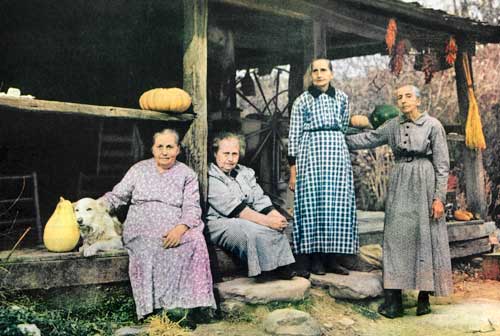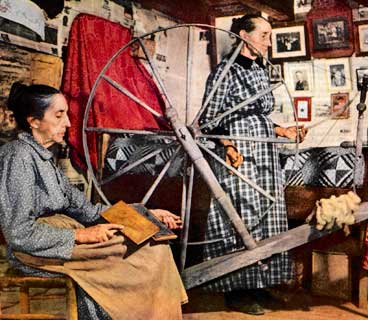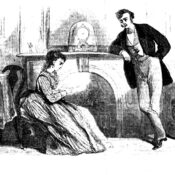“Time Stood Still in the Smokies” is one of the most memorable articles I’ve come across in the pages of The Saturday Evening Post. It tells of four middle-aged sisters (one passed away about a year before the article) who lived contentedly in a Smoky Mountain log home built by their grandfather when Abe Lincoln was still practicing law. The Walker sisters lived as their forebears did, churning butter, spinning their own cloth, cutting wood for fuel and even stretching and drying sheepskin.
I was delightfully reminded of the article when I heard from a park ranger named Samantha. She had recently hiked to the sister’s cabin, which is now within the Great Smoky Mountains National Park. In her e-mail, Samantha wrote that the sisters “were introduced to the world in (I believe) 1949 through an article in your magazine. I would love to have a copy of the article…”
Actually the year was 1946, Samantha, and you are not the first to request this article. It tends to stick in people’s minds (like mine) years after they’ve read it. I had forgotten some of the humorous anecdotes and how delightful these sisters were, even if a bit prim.
Most American households in that year felt blessed not only with electricity and indoor plumbing, but vacuum cleaners, washing machines and modern kitchen appliances. Food came from supermarkets and clothing and household items from department stores. So why would you want to live as if it were the early nineteenth century?
It was not, author John Maloney wrote, “through the slightest trace of eccentricity or any dislike of progress, but simply because, as women without menfolk around, they have continued doing things in the ways and with the implements they know best how to use—which is to say, their father’s and grandfather’s methods and tools.”
The four unmarried sisters (but Polly died in 1945) continued the way of life they and their siblings (eleven in all) had always known. They had no interest in moving or changing.
“Why, they reason, should anyone want to worry about changes and improvements when the ground is so fertile, one of their two cows is always fresh, their spring flows freely, and heavy forests around them provide all the fuel they need? A sympathetic visitor can find no answer.”

We are shown photos of the sisters, ranging in age from fifty-six to seventy-five, at the spinning wheel, stretching and drying sheepskin and just enjoying an autumn respite on their front porch.
They raised fewer sheep than their folks did, but kept six or eight each year. “Any one of them can catch a buck or ewe,” Maloney writes, “hogtie it and hoist it, bleating and kicking, to the rack where they do the shearing.”
And they didn’t just card wool for their own needs.
“Martha showed me winter dresses she had made from their own wool while Margaret hummed away, spinning thread that would go into warm stockings for themselves or socks for nephews still overseas. ‘Guess it ain’t every soldier in Germany that can say his old-maid aunts raised his socks off’n a rocky mountainside for him,’ Hetty observed as she looked on. ‘I hear them Europe winters can be powerful cold, and we don’t aim for any of our folks to have cold feet, no matter where they are.’”
There’s a charming story about the sheep and the author and photographer, David Robbins. The photographer asked if they could catch one and shear it for a photo.
“Margaret got feed, called, ‘Here, sheepie, sheepie, sheepie!’ and got them almost within noosing range. Then they saw (the photographer) and bolted back up the mountain. No amount of calling would tempt them down again, nor would they follow a trail of grain we laid for them. ‘They won’t come down again as long as there’s anybody around with pants on,’ Margaret said, and we found she was right. ‘Sorry, no sheep pictures.’”
About the only thing they didn’t do was plow, and that was only because of their mule.
“In his old age that mule has got so bullheaded he won’t let us girls work him,” Margaret explained. “When we want land plowed or logs dragged down from the mountain for firewood, one of our relatives has to come and work him for us. A Tennessee mule has got to be handled special, and none of us can cuss.”
I hope you find this article as memorable as Samantha and I did. It’s a good example of the type of article people still remember years after they read them.
![]() Read the first two pages of “Time Stood Still in the Smokies” by John Maloney.
Read the first two pages of “Time Stood Still in the Smokies” by John Maloney.
Become a Saturday Evening Post member and enjoy unlimited access. Subscribe now




Comments
I love this article BECAUSE my Father and his family were from Overton Co. Tn. His name was Jonathon Burris Walker son of Robert E. Walker and Martha Jane Shelton Walker.
Here’s the full article. http://www.saturdayeveningpost.com/wp-content/uploads/satevepost/time-stood-still-in-the-smokies-SEP.pdf
I’m delighted to find this article ! My research on the charkha (spinning wheel in Hindi) always throws up something interesting ! Thank you. Sunaina Suneja, Delhi, India
You have to love their old mule.
Loved the article
Bob and I experienced visiting with Wilma Maples, owner of the Gatlinburg Inn, several times over the years. She told us about the Walker Sisters and we purchased their book about five years ago. My dad was still living then and very interested in going to visit their old homeplace in the Smokey Mountains. We all journeyed up the hill, a very long hike, and found the property still there and took pictures. We were quite surprised to see this article on-line and will share it with our friend in Gatlinburg by calling her and having her staff show it to her. Thanks
for sharing your thoughts about the Walker Sisters with your readers.
Mémoire.
Quand le son
de la nuit
m’appelle
tendrement
j’écoute la lumière
des visages
solitaires comme
le chant du
matin qui décrit
le sourire.
Francesco Sinibaldi